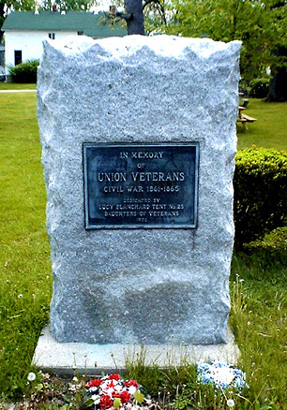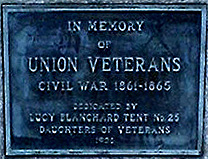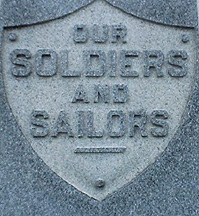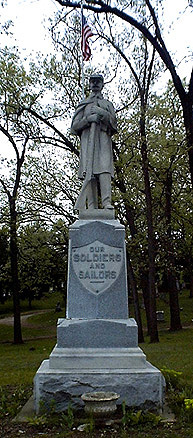|
The picture above was taken on 4 July 1892, in front of Col. Mann's house on Walnut Street. The house stood
where the Library is now. These are the remnants of the original GAR in Fenton. A list of who is in the picture is as follows......
 |
 |
1. Smith Crisfall
2. Seymour Thompson
3. William Butcher
4. Benjamin Botsford
5. Willie Butcher
6. William Brabon
7. Alfred Granson
8. Hopper
9. Joe Dibble
10. Frank Potter
11. George Dunn
|
12. George Bishop
13. George Adams
14. Marion Munson
15. Charles Vosburg
16. L.J. Tryon
17. By Vosburg
18. Andrew Holliday
19. V.B. Tryon
20. Edgar Durfee
21. Harry Craft
22. John Thorpe
|
23. Perry VanEpps
24. Ed. Hewitt
25. Hyram King
26. Peter Crimson
27. Ed. Dickerman
28. Anson Morehouse
29. Don Knapp
30. Roy Plumb
31. Louise Knapp
32. Fred Arthur
|
|
 |
 |

History of the GAR and SUVCW
Written by Matt Adair
As listed in the Plan for Restoration of the Memorial Cannons and Improvements to the Soldiers Monument in Oakwood Cemetery
More than 90,000 men from Michigan served in the Union in
defense of the United States during the Civil War. Of these, 30,000 never returned home to our state, to their families, to
their friends and to their loved ones, having made the "ultimate sacrifice." Many lie in graves "known but to God." Their
comrades who did return were determined that their sacrifice would not be in vain. In 1866, they organized the Grand Army
of the Republic (GAR) in order to preserve their memory and to care for their widows, orphans, and to he "who has borne the
battle." The Grand Army of the Republic was the first truly national veterans' organization in the country. Membership was
limited to veterans of the American Civil War who served as Soldiers, Sailors or Marines during 1861-1865.
Through the years, the ranks of the GAR began to thin as its
members answered the "last roll call." It became apparent that something would need to be done to perpetuate the memory of
the soldiers who had fought in defense of the Union. In 1881 the GAR formed the Sons of Veterans of the United States of America
(SV) to carry on its traditions and memory long after the GAR had ceased to exist. Membership was open to any man who could
prove ancestry to a member of the GAR or to a veteran eligible for membership in the GAR. In later years, men who did not
have the ancestry to qualify for hereditary membership, but who demonstrated a genuine interest in the Civil War and could
subscribe to the purpose and objectives of the SUVCW, were admitted as Associates. This practice continues today.
Many GAR Posts sponsored Camps of the SV. In 1925 the SV name
was changed to Sons of Union Veterans of the Civil War (SUVCW), under which its federal charter was issued in 1954. The Grand
Army of the Republic ceased to exist in 1956 with the death of its last member, Albert Woolson. Before passing away Comrade
Woolson legally transfered all assets and property of the GAR to the National Commandery-in-Chief of the SUVCW. Today, the
SUVCW continues to be the legally recognized heir and representative of the GAR.

Colonel Fenton Post No. 24, Grand Army of the Republic, was organized august
29, 1881, at Fenton, and is thus the oldest in the county. Its first commander was Dexter Horton, and since that time the
following named comrades have served in that capacity before1892.
MONUMENTS
 |
 |
|

GAR Monument at Freedom Park on Shiawassee Ave. in Fenton.
|

Closeup of plaque on the GAR Monument at Freedom Park on Shiawassee Ave. in Fenton.
|
|

Closeup of Soldiers and Sailors Monument at Oakwood Cemetery, in Fenton.
|

Soldiers and Sailors Monument at Oakwood Cemetery, in Fenton.
|
|
 |
 |
For more information on the GAR and SUVCW please
visit the
|

